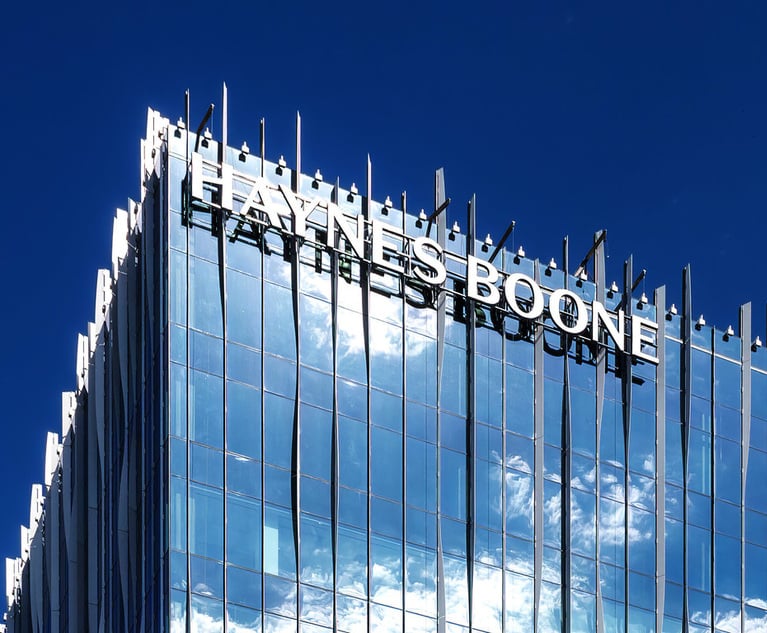 (L to R) Mark Pulliam, Josh Hammer and Tony McDonald are the three plaintiffs in McDonald v. Sorrels (Courtesy Photos)
(L to R) Mark Pulliam, Josh Hammer and Tony McDonald are the three plaintiffs in McDonald v. Sorrels (Courtesy Photos)With Payment Deadline Looming, Plaintiffs Challenging Texas Bar Dues Are Requesting a Status Conference
As the deadline looms to pay Texas Bar dues June 1, three lawyers who have sued and alleged mandatory dues are unconstitutional are asking a federal court whether they should set a hearing for a preliminary injunction to protect them from paying dues.
May 06, 2020 at 05:18 PM
4 minute read
The June 1 deadline to pay Texas bar dues is looming for three attorneys who are suing the State Bar of Texas, alleging that mandatory dues violate their constitutional rights.
In a new court filing Wednesday, the plaintiffs noted that they got their dues notices, which they see as coercing them into joining and funding the Texas bar just so they can engage in their profession.
"The bar continues to engage in political and ideological activities, including lobbying; and the bar continues to employ wholly inadequate opt-out procedures for members who object to its political activities," said a May 6 notice in the case, McDonald v. Sorrels.
As the litigation played out in 2019, the plaintiffs—Tony McDonald, Joshua Hammer and Mark Pulliam—agreed to delay a hearing on a motion for a preliminary injunction that was asking the court to protect them from having to pay 2019 bar dues. They wound up paying those dues under protest, partly because they believed U.S. District Judge Lee Yeakel of the Western District of Texas was planning to rule quickly on the parties' cross motions for summary judgment.
According to the notice, the plaintiffs thought the court was going to expedite the case. While they kept their motion for a preliminary injunction alive, they felt they didn't need a decision on that motion as long as the court resolved the case quickly.
But now that the day to pay 2020 dues is approaching, the plaintiffs are asking the court for a status conference "to discuss how they should proceed with the upcoming dues cycle." They wonder if they should set a hearing for their preliminary injunction motion.
After an August 2019 hearing, Yeakel told the parties' attorneys that he would rule quickly, and he had everything that he needed in the record to dispose of the case on the merits. However, Yeakel also said at that hearing that he was dismissing the plaintiffs' motion for a temporary injunction.
The attorney-plaintiffs claim the bar violates their First Amendment rights by forcing them to join and pay mandatory dues, which the bar then spends on alleged political and ideological activities. They object to the bar's LGBT continuing legal education offerings, pro bono program for undocumented immigrants, attorney diversity programs, a $65 legal aid fee and the bar's legislative affairs activities.
The bar has denied the plaintiffs' allegations and argued that Janus shouldn't apply to mandatory bar associations and that it's already complying with other U.S. Supreme Court cases that directly impact bar associations by ensuring all dues pay for core functions like regulating the legal profession and improving the quality of legal services.
The case is similar to legal challenges that lawyers have filed against mandatory bar associations in other states, which all rely on a 2018 U.S. Supreme Court ruling in Janus v. AFSCME, which ruled that public sector nonunion workers cannot be required to pay union dues as a condition of employment.
Multiple courts have ruled against the lawyer-plaintiffs in the cases in other states.
Related stories:
This content has been archived. It is available through our partners, LexisNexis® and Bloomberg Law.
To view this content, please continue to their sites.
Not a Lexis Subscriber?
Subscribe Now
Not a Bloomberg Law Subscriber?
Subscribe Now
NOT FOR REPRINT
© 2024 ALM Global, LLC, All Rights Reserved. Request academic re-use from www.copyright.com. All other uses, submit a request to [email protected]. For more information visit Asset & Logo Licensing.
You Might Like
View All
Advising 'Capital-Intensive Spaces' Fuels Corporate Practice Growth For Haynes and Boone
4 minute read
Homegrown Texas Law Firms Expanded Outside the Lone Star State in 2024 As Out-of-State Firms Moved In
5 minute read
Energy Lawyers Working in Texas Expect Strong Demand to Continue in 2025 Across Energy Sector
6 minute read
'So Many Firms' Have Yet to Announce Associate Bonuses, Underlining Big Law's Uneven Approach
5 minute readTrending Stories
- 1Considering the Implications of the 2024 Presidential Election for Jurors in White Collar Cases
- 22024 in Review: Judges Met Out Punishments for Ex-Apple, FDIC, Moody's Legal Leaders
- 3What We Heard From Litigation Leaders in 2024
- 4Akin and Simpson Create New Practice Groups With Integrated Teams
- 5Thursday Newspaper
Who Got The Work
Michael G. Bongiorno, Andrew Scott Dulberg and Elizabeth E. Driscoll from Wilmer Cutler Pickering Hale and Dorr have stepped in to represent Symbotic Inc., an A.I.-enabled technology platform that focuses on increasing supply chain efficiency, and other defendants in a pending shareholder derivative lawsuit. The case, filed Oct. 2 in Massachusetts District Court by the Brown Law Firm on behalf of Stephen Austen, accuses certain officers and directors of misleading investors in regard to Symbotic's potential for margin growth by failing to disclose that the company was not equipped to timely deploy its systems or manage expenses through project delays. The case, assigned to U.S. District Judge Nathaniel M. Gorton, is 1:24-cv-12522, Austen v. Cohen et al.
Who Got The Work
Edmund Polubinski and Marie Killmond of Davis Polk & Wardwell have entered appearances for data platform software development company MongoDB and other defendants in a pending shareholder derivative lawsuit. The action, filed Oct. 7 in New York Southern District Court by the Brown Law Firm, accuses the company's directors and/or officers of falsely expressing confidence in the company’s restructuring of its sales incentive plan and downplaying the severity of decreases in its upfront commitments. The case is 1:24-cv-07594, Roy v. Ittycheria et al.
Who Got The Work
Amy O. Bruchs and Kurt F. Ellison of Michael Best & Friedrich have entered appearances for Epic Systems Corp. in a pending employment discrimination lawsuit. The suit was filed Sept. 7 in Wisconsin Western District Court by Levine Eisberner LLC and Siri & Glimstad on behalf of a project manager who claims that he was wrongfully terminated after applying for a religious exemption to the defendant's COVID-19 vaccine mandate. The case, assigned to U.S. Magistrate Judge Anita Marie Boor, is 3:24-cv-00630, Secker, Nathan v. Epic Systems Corporation.
Who Got The Work
David X. Sullivan, Thomas J. Finn and Gregory A. Hall from McCarter & English have entered appearances for Sunrun Installation Services in a pending civil rights lawsuit. The complaint was filed Sept. 4 in Connecticut District Court by attorney Robert M. Berke on behalf of former employee George Edward Steins, who was arrested and charged with employing an unregistered home improvement salesperson. The complaint alleges that had Sunrun informed the Connecticut Department of Consumer Protection that the plaintiff's employment had ended in 2017 and that he no longer held Sunrun's home improvement contractor license, he would not have been hit with charges, which were dismissed in May 2024. The case, assigned to U.S. District Judge Jeffrey A. Meyer, is 3:24-cv-01423, Steins v. Sunrun, Inc. et al.
Who Got The Work
Greenberg Traurig shareholder Joshua L. Raskin has entered an appearance for boohoo.com UK Ltd. in a pending patent infringement lawsuit. The suit, filed Sept. 3 in Texas Eastern District Court by Rozier Hardt McDonough on behalf of Alto Dynamics, asserts five patents related to an online shopping platform. The case, assigned to U.S. District Judge Rodney Gilstrap, is 2:24-cv-00719, Alto Dynamics, LLC v. boohoo.com UK Limited.
Featured Firms
Law Offices of Gary Martin Hays & Associates, P.C.
(470) 294-1674
Law Offices of Mark E. Salomone
(857) 444-6468
Smith & Hassler
(713) 739-1250






